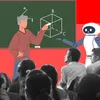Scaler unveils AI teaching assistant powered by GPT-4 for learners
By integrating ChatGPT functionalities into the Scaler Academy programme, the company aims to tackle three potential pain points: understanding problems, identifying optimal problem-solving approaches, and code debugging.
Edtech firm has unveiled a GPT-4-powered AI teaching assistant to offer learners round-the-clock support and decrease the doubt resolution time.
By integrating ChatGPT functionalities into the Scaler Academy programme, the company aims to tackle three potential pain points: understanding problems, identifying optimal problem-solving approaches, and code debugging.
According to the company, the GPT-powered feature offers suitable responses to learners' queries, safeguarding against revealing direct solutions, and promoting independent problem-solving.
In addition, the Tiger Global-backed company has introduced the 'Text Help Request' (THR) feature, utilising advanced machine learning algorithms like BERT (Bidirectional Encoder Representations from Transformers) to provide doubt resolution with accurate and contextually relevant guidance based on learners' queries.
“Previously, our Scaler learners relied solely on teaching assistants who were available for 15 hours a day to address their doubts. However, with the launch of our GPT-4 powered AI teaching assistant and the THR feature, learners can now have their doubts and queries addressed instantly,” Abhimanyu Saxena, Co-founder of and , said.
The company has about 250 to 300 teaching assistants—full-time working professionals who work with it as freelancers—dedicating 2-10 hours during their free time to review code and provide guidance for students, Saxena told YourStory.
He added that while Scaler now has an AI teaching system for instant advice, students can always choose to reach out to a human teaching assistant.
For instance, sometimes, students may find it challenging to express their questions precisely to the AI system. In such cases, it is more convenient for them to connect with a human teaching assistant to explain their doubts and points of confusion more clearly, Saxena explained.
Investment and development
During a three-month project, the company utilised public, large language models (LLMs) and experimented with various open-source models. The initial development cost, including research and development, totalled around $250,000, and training the custom model incurred a one-time cost of approximately $20,000, according to Saxena.
During the pilot launch a month ago, 6,000 learners from the Scaler Academy programme gained access to the AI teaching assistant, and Scaler plans to extend access to both the AI assistant and THR features to all 35,000 learners in its ecosystem over the next three months.
As per Saxena, if 100,000 people raise one help request per day, the recurring cost of using an LLM would amount to about $10,000 per month.
Apart from these AI features, the company is also considering the implementation of a live teaching assistant.
“We are exploring the possibility of having a live teaching assistant during classes to provide personalised support to students who may have questions but are hesitant to interrupt the teacher,” Saxena said, adding that this would allow every student in the class to have their own personal tutor alongside the main instructor.
AI in edtech
Within a week of implementation, Scaler said it saw a 30% increase in help request resolution and over 33% more learners using the AI tool to solve problems independently. Additionally, learners accessing the ChatGPT-powered AI teaching assistant were 10-20% less likely to seek external help, it added.
Saxena highlighted that technology significantly improves turnaround time and assistance quality, creating a more consistent learning experience with standardised AI on top of the human layer.
“This is not just a passing hype, but a technology that will make a lasting impact. There is a significant opportunity to create superior learning products with AI,” he noted.
Edited by Kanishk Singh








